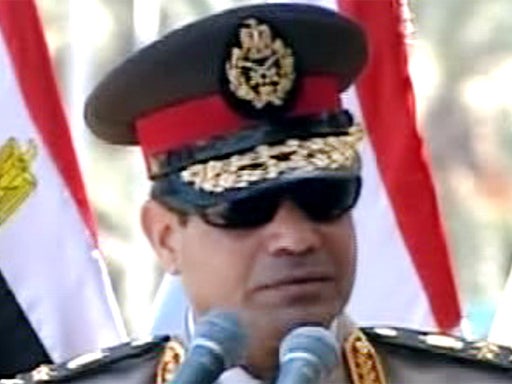Showdown in Cairo: Egyptian general demands permission to take on the ‘terrorists’
General Sisi accused of resembling a banana republic dictator in appeal for masses to back ‘terrorist’ crackdown

A decisive confrontation may be looming between Egypt’s military and the Muslim Brotherhood after General Abdel Fattah al-Sisi, the country’s top commander, issued an unprecedented call for mass demonstrations on Friday to grant his forces a “mandate” to crack down on “terrorism”.
The request, which was issued during a televised speech by Gen. al-Sisi at a military parade, was widely interpreted as a shot across the bows of the Muslim Brotherhood – a group which has faced increasing demonisation from politicians and talk show hosts in recent weeks.
Amid the febrile and bitter atmosphere which is enveloping the country, Brotherhood leaders have been accused of cultivating connections to Islamist radicals in the lawless North Sinai region and inciting violent protests across Egypt.
Supporters of Mohamed Morsi, the toppled Brotherhood President, are still maintaining separate sit-ins outside Cairo University and also in Nasr City, an eastern suburb in the capital.
If large numbers of protesters heed Gen. al-Sisi’s call on Friday, it raises the prospect of another dangerous confrontation following a month in which more than 100 people have been killed.
“Are we going to see Egypt’s first democratic massacre?” said one activist on Twitter, in reference to a belief among some that the military was seeking a popular mandate to crush the Brotherhood.
Ahmed el-Hawary, a co-founder of the liberal Dostour Party, told the Independent that while he respected the right of peaceful protest, he supported a crackdown against the Brotherhood’s senior figures.
“The leadership should be tried as criminals and terrorists,” he said, adding that the EU was guilty of encouraging the group’s continued recalcitrance.
Gen al-Sisi’s intervention came following a bomb blast yesterday morning outside the security service headquarters in Mansoura, a city in the Nile Delta. Local media reported that one person was killed and 28 injured in the explosion, which officials said had been caused by a timed TNT device.
But his speech has also raised serious questions about the military’s role in Egypt’s transitional government.
The coalition of youth groups, secularists and liberals which conspired to topple Mr Morsi had initially expressed confidence that the army would not meddle in the affairs of the new civilian cabinet.
It now seems clear that the commander-in-chief – who acts as both Defence Minister and First Deputy Prime Minister – is pulling many of the strings.
“This is dangerous,” said Emad el-Din Shahin, a Cairo-based professor in public policy. “They are leading the country towards a populist, mob-based polity.”
Following a previous revolution in Egypt – the 1952 coup d’état which eventually ushered in Gamal Abdel Nasser – the government erected desert concentration camps to imprison up to 20,000 Islamists who had been detained by the security forces.
If Gen al-Sisi were to attempt his own crackdown on the Brotherhood, he may find he has the sympathy of a significant swathe of the population.
The man who directed the popular coup against Mr Morsi is currently riding a wave of post-revolutionary popularity. Photos of him alongside Nasser are carried by proud protesters in Tahrir Square, while barbers and shopkeepers post his picture on their walls.
In a country where notions of patriotism and the military are inextricably linked, the rising tide of nationalism– and the accompanying portrayal of the Brotherhood as a belligerent fifth column – has helped bolster his position.
According to Mr El-Din Shahin, Gen al-Sisi’s speech – which he delivered wearing wrap-around shades beneath the peak of his gold-embroidered khaki cap – showed he might even be angling for the presidency.
“He looked exactly like a general from a 1970s banana republic,” he said. “He is playing to the sentiments of the Egyptian people and their support for the military institution.”
Following the televised address, some of the political forces behind Morsi’s ouster welcomed his appeal for mass protests tomorrow. “We have a new kind of democracy in Egypt,” said Shehab Wagih, from the liberal Free Egyptians Party. “It is called city square democracy.”
Join our commenting forum
Join thought-provoking conversations, follow other Independent readers and see their replies
Comments